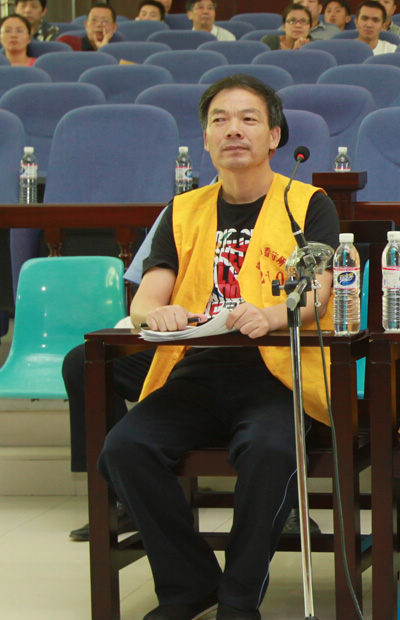|
 |
|
ON TRIAL: Tang Chengqi, former Vice Mayor of Nanchang, central China's Jiangxi Province, appears in court on August 19. Tang was sentenced to death with a two-year reprieve on charges of taking bribes totaling 39.01 million yuan ($6.19 million) (HU JINWU) |
China will impose a new five-year plan to tackle corruption following the upcoming national congress of the Communist Party of China (CPC), senior official He Guoqiang said on August 21. The new work plan for 2013 to 2018 would be the second of its kind as the first one was released in 2008.
He, a member of the Standing Committee of the Political Bureau of the CPC Central Committee, expressed readiness to improve anti-corruption efforts, describing the improvements as a "dynamic and long-term strategic project."
The 18th CPC National Congress will find new ways to prevent corruption both now and in the future, said He, who is also head of the CPC Central Commission for Discipline Inspection (CCDI), the Party's anti-graft watchdog.
He said China has always paid great attention to fighting corruption and creating a clean government, adding that the country has created its own unique methods to combat corruption.
The formation of the new five-year plan should be based on the results of the previous plan, as well as past experience, He said, urging discipline officials to prioritize solving problems that are widely faced by the public and find new ways to suppress and prevent corruption.
According to the website of the Nandu Daily newspaper, the CPC's new anti-graft plan could come out in the middle of next year at the earliest.
Ren Jianming, an associate professor at the School of Public Policy and Management of Tsinghua University, was quoted by Nandu Daily as saying that the drafting of the work plan started as early as May 2010 and scholars have been invited to carry out surveys and studies, whose results are used as references.
Li Xueqin, head of the CCDI's Research Division, told Xinhua News Agency that while the first five-year work plan was to establish an anti-corruption mechanism, the next five years would be spent in "perfecting that mechanism" with a focus on preventing abuses of power.
Intensified crackdown
Li said that in the first 10 years after the Party declared a war on corruption in 1993, the strategy was to curb the rising trend of corruption, and the main tasks were upholding leaders' integrity and investigating cases. In the past 10 years, however, the main focus has shifted to prevention, and to eradicating the roots of corruption, according to Li.
Since the 16th National Congress of the CPC in 2002, the Party has taken various measures to combat corruption through developing a set of systems, mechanisms and methods to restrict and monitor the exercise of power.
Jiang Hui, a research fellow with the Chinese Academy of Social Sciences, told Xinhua that the country's leadership has placed the fight against corruption high on its agenda over the past 10 years.
In a speech last July, President Hu Jintao, also General Secretary of the CPC Central Committee, warned that corruption is one of the growing dangers that confront the Party and it has become more important and urgent for the Party to police itself and impose strict discipline on its members.
In his speech at the Party School of the CPC Central Committee on July 23, Hu again listed fighting corruption unswervingly as one of the efforts that must be continued to promote Party building.
From December 2002 to June 2007, a total of 518,484 CPC members were punished according to Party disciplines. During the same period, the CPC's disciplinary organs across the country also registered 677,924 cases and settled 679,846 ones including those registered before 2002, according to the CCDI's report to the 17th CPC National Congress.
During those five years, the CPC also disciplined several senior officials including former Shanghai Party chief Chen Liangyu, former Deputy Secretary of the CPC Shandong Provincial Committee Du Shicheng, and former Director of the State Food and Drug Administration Zheng Xiaoyu.
Zheng was sentenced to death by a court in May 2007 after being found guilty of taking 6.49 million yuan ($1.03 million) in bribes and dereliction of duty and was executed in July 2007.
More than 60 officials at the ministerial and provincial levels had been punished for discipline violations since the Party's last national congress in 2007. These high-level officials were among 600,000 people who faced punishment for violating Party and government discipline standards, according to a statement from the CCDI on July 26.
| 